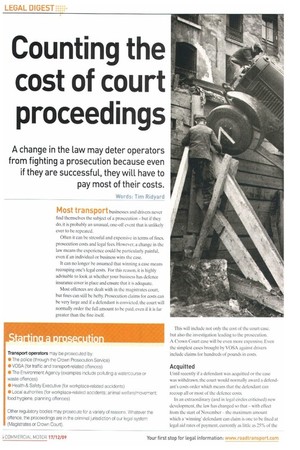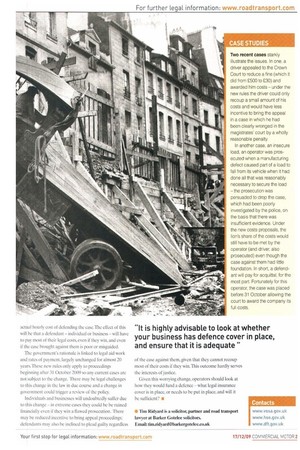Counting the cost of court proceedings
Page 26

Page 27

If you've noticed an error in this article please click here to report it so we can fix it.
A change in the law may deter operators from fighting a prosecution because even if they are successful, they will have to pay most of their costs.
Words: Tim Ridyard Most transport businesses and drivers never find themselves the subject of a prosecution — but if they do, it is probably an unusual, one-off event that is unlikely ever to be repeated.
Often it can be stressful and expensive in terms of fines, prosecution costs and legal fees. However, a change in the law means the experience could he particularly painful, even if an individual or business wins the case.
It can no longer be assumed that winning a case means recouping one's legal costs For this reason, it is highly advisable to look at whether your business has defence insurance cover in place and ensure that it is adequate.
Most offences are dealt with in the magistrates court, but fines can still be hefty. Prosecution claims for costs can be very large and if a defendant is convicted, the court will normally order the full amount to be paid, even if it is far greater than the fine itself. This will include not only the cost of the court case, but also the investigation leading to the prosecution. A Crown Court case will be even more expensive. Even the simplest cases brought by VOSA against drivers include claims for hundreds of pounds in costs.
Acquitted
Until recently if a defendant was acquitted or the case was withdrawn, the court would normally award a defendant's costs order which means that the defendant can recoup all or most of the defence costs.
In an extraordinary (and in legal circles criticised) new development, the law has changed so that — with effect from the start of November — the maximum amount which a 'winning' defendant can claim is one to be fixed at legal aid rates of payment, currently as little as 25% of the actilial hourly cost of defending the case.The effect of this will be that a defendant — individual or business — will have to pay most of their legal costs, even if they win, and even if the case brought against them is poor or misguided.
The government's rationale is linked to legal aid work and rates of payment, largely unchanged for almost 20 years. These new rules only apply to proceedings beginning after 31 October 2009 so any current cases are not subject to the change. There may be legal challenges to this change in the law in due course and a change in government could trigger a review of the policy.
Individuals and businesses will undoubtedly suffer due to this change — in extreme cases they could be be ruined financially even if they win a flawed prosecution. There may be reduced incentive to bring appeal proceedings; defendants may also he inclined to plead guilty regardless of the case against them, given that they cannot recoup most of their costs if they win. This outcome hardly serves the interests of justice.
Given this worrying change, operators should look at how they would fund a defence — what legal insurance cover is in place, or needs to be put in place, and will it be sufficient'? • • Tim Ridyard is a solicitor, partner and road transport lawyer at Barker Gotelee solicitors. Email: tim.ridyard@barkergotelee.co.uk
























































































































































